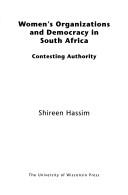
ISBN: 1282269992 9786612269998 0299213838 9780299213831 0299213803 9780299213800 0299213846 9780299213848 9781282269996 6612269995 Year: 2006 Publisher: Madison : University of Wisconsin Press,
Abstract | Keywords | Export | Availability | Bookmark
 Loading...
Loading...Choose an application
- Reference Manager
- EndNote
- RefWorks (Direct export to RefWorks)
Women --- Women and democracy --- Feminism --- Gender Studies & Sexuality --- Gender & Ethnic Studies --- Social Sciences --- Human females --- Wimmin --- Woman --- Womon --- Womyn --- Females --- Human beings --- Femininity --- Emancipation of women --- Feminist movement --- Women's lib --- Women's liberation --- Women's liberation movement --- Women's movement --- Social movements --- Anti-feminism --- Democracy and women --- Democracy --- Political activity --- Societies and clubs --- Emancipation --- Femmes --- Femmes et démocratie --- Féminisme --- Societies and clubs. --- Activité politique --- Associations --- South Africa --- Afrique du Sud --- Politics and government --- Politique et gouvernement

ISBN: 1282863738 9786612863738 0773573127 9780773573123 0773529934 9780773529939 0773529535 9780773529533 9781282863736 6612863730 Year: 2005 Publisher: Montreal ; Ithaca, NY : Chesham : McGill-Queen's University Press ; Combined Academic [distributor],
Abstract | Keywords | Export | Availability | Bookmark
 Loading...
Loading...Choose an application
- Reference Manager
- EndNote
- RefWorks (Direct export to RefWorks)
Filling a void in feminist studies of women and war, Women in Zones of Conflict challenges the traditional view, which suggests a natural connection between women and pacifism, based on the feminine qualities of caring, cooperation, and empathy. Feminist studies of nationalism also envision women as either victimized by patriarchy within nationalist movements or as adopting masculine qualities to conform to the culture of their male compatriots. Jacoby takes an alternative approach, considering how women are situated across the political spectrum. She argues that when categories other than gender - such as class, ethnicity, religion, and political perspective - are considered, there is no single perspective on what it means to be a woman in conflict.
Women in politics --- Women and democracy --- Sex discrimination against women --- Women and war --- War and society --- Society and war --- War --- Sociology --- Civilians in war --- Sociology, Military --- War and women --- Women and the military --- Discrimination against women --- Subordination of women --- Women, Discrimination against --- Feminism --- Sex discrimination --- Women's rights --- Male domination (Social structure) --- Democracy and women --- Democracy --- Social aspects --- Women --- Political activity --- Human females --- Wimmin --- Woman --- Womon --- Womyn --- Females --- Human beings --- Femininity --- 5.225.
Book
ISBN: 1498503209 0739190261 9780739190265 9780739190258 0739190253 9781498503204 Year: 2015 Publisher: Lanham, Maryland : Lexington Books,
Abstract | Keywords | Export | Availability | Bookmark
 Loading...
Loading...Choose an application
- Reference Manager
- EndNote
- RefWorks (Direct export to RefWorks)
This book examines the role of women involved in South Korea's democratization movement. Through its study of older women and the gender roles and values of Korean society manifested in the "Mothers" movement, this book challenges social movement theories that focus on those on the front line but ignore those behind the scenes.
Women --- Women and democracy --- Protest movements --- Social movements --- Democratization --- Democratic consolidation --- Democratic transition --- Political science --- New democracies --- Democracy and women --- Democracy --- Political activity --- Korea (South) --- Politics and government --- K9327 --- K9300.80 --- K9500.80 --- K9309 --- Korea: Communities, social classes and groups -- gender roles, women, feminism, men --- Korea: Social sciences -- social and cultural history -- modern period, postwar period (1945- ) --- Korea: Politics -- history -- modern period, postwar period (1945- ) --- Korea: Social sciences, society -- social theory, movements and protests
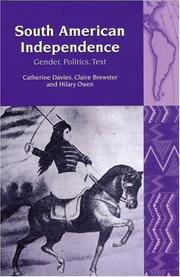
ISBN: 9781846314117 1846314119 9781846310270 184631027X 9781781387979 1781387974 9781846310270 184631027X 1846316847 9781846316845 Year: 2006 Publisher: Liverpool : Liverpool University Press,
Abstract | Keywords | Export | Availability | Bookmark
 Loading...
Loading...Choose an application
- Reference Manager
- EndNote
- RefWorks (Direct export to RefWorks)
The struggles for independence in Latin America during the first half of the nineteenth century were accompanied by a wide-ranging debate about political rights, nationality and citizenship. In South American Independence, Catherine Davies, Claire Brewster and Hilary Owen investigate the neglected role of gender in that discussion. Examining women writers from Brazil, Argentina, Chile, Peru, and Colombia, the book traces the contradictions inherent in revolutionary movements that, while arguing for the rights of all, remained ambivalent, at best, about the place of women. Through studies of both published and unpublished writings, South American Independence reveals the complex role of women in shaping the vexed ideologies of independence.
Women --- Women and democracy --- Sex role --- Women's rights --- Gender role --- Sex (Psychology) --- Sex differences (Psychology) --- Social role --- Gender expression --- Sexism --- Democracy and women --- Democracy --- Human females --- Wimmin --- Woman --- Womon --- Womyn --- Females --- Human beings --- Femininity --- Rights of women --- Human rights --- Political activity --- History --- Political aspects --- Civil rights --- Law and legislation --- Legal status, laws, etc. --- South America --- Politics and government --- Latin American literature --- History. --- History and criticism. --- Latin America
Book
ISBN: 1283897385 0812204972 0812243188 0812243242 0812204344 081222261X 1283896729 9781283896726 9780812204346 Year: 2011 Publisher: Philadelphia : University of Pennsylvania Press,
Abstract | Keywords | Export | Availability | Bookmark
 Loading...
Loading...Choose an application
- Reference Manager
- EndNote
- RefWorks (Direct export to RefWorks)
Since the 1990's, sexual violence in conflict zones has received much media attention. In large part as a result of grassroots feminist organizing in the 1970's and 1980's, mass rapes in the wars in the former Yugoslavia and during the Rwandan genocide received widespread coverage, and international organizations-from courts to NGO's to the UN-have engaged in systematic efforts to hold perpetrators accountable and to ameliorate the effects of wartime sexual violence. Yet many millennia of conflict preceded these developments, and we know little about the longer-term history of conflict-based sexual violence. Sexual Violence in Conflict Zones helps to fill in the historical gaps. It provides insight into subjects that are of deep concern to the human rights community, such as the aftermath of conflict-based sexual violence, legal strategies for prosecuting it, the economic functions of sexual violence, and the ways perceived religious or racial difference can create or aggravate settings of sexual danger. Essays in the volume span a broad geographic, chronological, and thematic scope, touching on the ancient world, medieval Europe, the American Revolutionary War, precolonial and colonial Africa, Muslim Central Asia, the two world wars, and the Bangladeshi War of Independence. By considering a wide variety of cases, the contributors analyze the factors making sexual violence in conflict zones more or less likely and the resulting trauma more or less devastating. Topics covered range from the experiences of victims and the motivations of perpetrators, to the relationship between wartime and peacetime sexual violence, to the historical background of the contemporary feminist-inflected human rights moment. In bringing together historical and contemporary perspectives, this wide-ranging collection provides historians and human rights activists with tools for understanding long-term consequences of sexual violence as war-ravaged societies struggle to achieve post conflict stability.
American fiction --- Women in public life --- Women and democracy --- Genius. --- Genius in literature. --- Women in literature. --- Democracy and women --- Democracy --- Creative ability --- Intelligence levels --- Woman (Christian theology) in literature --- Women in drama --- Women in poetry --- History and criticism. --- Women authors --- History. --- Cultural Studies. --- Literature. --- Rape as a weapon of war --- Women and war --- Women (International law) --- Women --- War crimes --- War victims --- Violence against --- Crimes against --- Human Rights. --- Law.
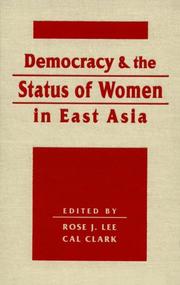
ISBN: 1555878881 1626373272 Year: 2000 Publisher: Boulder, Colorado ; London, [England] : Lynne Rienner Publishers,
Abstract | Keywords | Export | Availability | Bookmark
 Loading...
Loading...Choose an application
- Reference Manager
- EndNote
- RefWorks (Direct export to RefWorks)
Though modernization and democratization have benefited many women in developing countries, capitalist development has often reproduced patriarchal roles and stereotypes. This collection examines how the processes of modernization and democratization have affected women in East Asia.
Women and democracy --- Women --- Women's rights --- Patriarchy --- Femmes et démocratie --- Femmes --- Patriarcat (Sociologie) --- Political activity --- Government policy --- Activité politique --- Politique gouvernementale --- Droits --- -Women in politics --- -Women --- -Women's rights --- -Patriarchy --- -K9327 --- Democracy and women --- Democracy --- Androcracy --- Patriarchal families --- Fathers --- Families --- Male domination (Social structure) --- Patrilineal kinship --- Rights of women --- Human rights --- Human females --- Wimmin --- Woman --- Womon --- Womyn --- Females --- Human beings --- Femininity --- Women in politics --- -Korea: Communities, social classes and groups -- gender roles, women, feminism, men --- Civil rights --- Law and legislation --- Legal status, laws, etc. --- Femmes et démocratie --- Activité politique --- K9327 --- Korea: Communities, social classes and groups -- gender roles, women, feminism, men
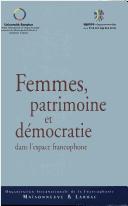
ISBN: 270681697X Year: 2003 Publisher: Paris : Maisonneuve et Larose,
Abstract | Keywords | Export | Availability | Bookmark
 Loading...
Loading...Choose an application
- Reference Manager
- EndNote
- RefWorks (Direct export to RefWorks)
Women --- Cultural property --- Women and democracy --- Femmes --- Biens culturels --- Femmes et démocratie --- Social conditions --- Congresses --- Congresses. --- Conditions sociales --- Congrès --- 329.273 --- 396 --- 316.7 --- Onafhankelijkheidsbeweging --- Feminisme. Vrouwenbeweging. Vrouw en maatschappij --- Cultuursociologie --(algemeen) --- 316.7 Cultuursociologie --(algemeen) --- 396 Feminisme. Vrouwenbeweging. Vrouw en maatschappij --- 329.273 Onafhankelijkheidsbeweging --- Femmes et démocratie --- Congrès --- Human females --- Wimmin --- Woman --- Womon --- Womyn --- Females --- Human beings --- Femininity --- Democracy and women --- Democracy --- Cultural heritage --- Cultural patrimony --- Cultural resources --- Heritage property --- National heritage --- National patrimony --- National treasure --- Patrimony, Cultural --- Treasure, National --- Property --- World Heritage areas
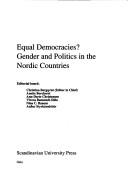
ISBN: 8200127990 Year: 1999 Publisher: Oslo Scandinavian University Press
Abstract | Keywords | Export | Availability | Bookmark
 Loading...
Loading...Choose an application
- Reference Manager
- EndNote
- RefWorks (Direct export to RefWorks)
De Scandinavische gebieden worden vaak beschouwd als een plaats waar er een grote gelijkheid onder de seksen heerst. Dit boek gaat op zoek naar de waarheid achter dit beeld aan de hand van de vragen: Hoe gelijk zijn mannen en vrouwen in Scandinavië? en hoe homogeen zijn de Scandinavische landen? Het boek toont aan dat er inderdaad vele overeenkomsten zijn tussen de landen, maar dat de processen van gelijkheid in de verschillende landen op vele vlakken anders zijn en dat deze verschillen groter zijn dan aanvankelijk aangenomen.
Sex role --- Women and democracy --- Women --- #SBIB:002.IO --- #SBIB:316.346H40 --- #SBIB:35H439 --- Human females --- Wimmin --- Woman --- Womon --- Womyn --- Females --- Human beings --- Femininity --- Democracy and women --- Democracy --- Gender role --- Sex (Psychology) --- Sex differences (Psychology) --- Social role --- Gender expression --- Sexism --- Political activity --- Gender studies: emancipatiebeleid --- Beleidssectoren: andere beleidssectoren --- Sociology of the family. Sociology of sexuality --- Sociology of work --- Sociology of social care --- Community organization --- Social policy --- Political systems --- Political parties --- Politics --- Europe: North --- Gender roles --- Gendered role --- Gendered roles --- Role, Gender --- Role, Gendered --- Role, Sex --- Roles, Gender --- Roles, Gendered --- Roles, Sex --- Sex roles --- Equal opportunities --- Family --- Childcare --- Labour --- Government policy --- Politicians --- Political participation --- Social movements --- Book --- Chiffres
Book
ISBN: 2882470525 2940503796 9782882470522 Year: 2003 Publisher: Berne: Département féderal des affaires étrangères. DDC, Direction du développement et de la coopération,
Abstract | Keywords | Export | Availability | Bookmark
 Loading...
Loading...Choose an application
- Reference Manager
- EndNote
- RefWorks (Direct export to RefWorks)
Globalization --- Power (Social sciences) --- Sex role --- Mondialisation --- Pouvoir (Sciences sociales) --- Rôle selon le sexe --- Women in development --- Women and democracy --- International economic relations --- Social aspects --- #SBIB:39A4 --- Toegepaste antropologie --- Rôle selon le sexe --- Sociology of the family. Sociology of sexuality --- Foreign trade. International trade --- Development aid. Development cooperation --- Democracy and women --- Democracy --- Economic policy, Foreign --- Economic relations, Foreign --- Economics, International --- Foreign economic policy --- Foreign economic relations --- Interdependence of nations --- International economic policy --- International economics --- New international economic order --- Economic policy --- International relations --- Economic sanctions --- Sex role. --- Women in development - Congresses --- Sex role - Congresses --- Women and democracy - Congresses --- International economic relations - Social aspects - Congresses --- Globalization - Social aspects - Congresses --- gouvernance --- société civile --- capitalisme --- politiques et pratiques du développement --- relations hommes-femmes --- citoyenneté --- empowerment --- sciences sociales --- pensée politique --- mouvements alternatifs --- culture religion et identité --- démocratie --- féminisme --- travail --- femmes --- Gender --- Development policy --- Book --- Conference paper
Book
ISBN: 9780199830084 9780199830091 0199830088 0199830096 0190236779 019983010X 1280594632 9786613624468 0199932921 Year: 2012 Publisher: Oxford [etc.] Oxford University Press
Abstract | Keywords | Export | Availability | Bookmark
 Loading...
Loading...Choose an application
- Reference Manager
- EndNote
- RefWorks (Direct export to RefWorks)
The introduction of electoral gender quotas in diverse contexts around the globe has attracted a great deal of scholarly and political interest. To date, research on these measures has focused primarily on quota design, adoption, and effects on the numbers of women elected. While this remains a crucial focus, quotas are not simply about changing the proportion of women in political office. Both supporters and opponents of quotas suggest, albeit from different perspectives, that positive action for women as candidates will influence the kinds of women elected, the policy-making process as it concerns women's issues, the way citizens view women in public life, and the relationship between female voters and the political process. Seeking to initiate a "second generation" of research on quotas, this volume is an effort to inspire a new literature focused on theorizing and studying the broader impact of quotas on politics and society. The book is structured in relation to three facets of political representation: the attributes of officeholders (descriptive representation); the promotion of group interests during the legislative process (substantive representation); and the broader cultural meanings and social consequences of political incorporation (symbolic representation). Within each section, the chapters include case studies from four regions of the world: Western Europe, Latin America, Sub-Saharan Africa, and Asia and the Middle East. This approach recognizes that quotas are a global phenomenon and that research on quotas and representation benefits from a comparative, cross-national approach. The Impact of Gender Quotas is a theory-building and comparative exercise in elaborating concepts commonly used to analyze the broad impacts of gender quotas. The book begins with the argument that the means by which women enter politics may influence how, why and to what extent their presence affects political representation. Following a preface by Drude Dahlerup, one of the pioneers of gender quota research, the editors introduce the book with a conceptual framework for analyzing the impact of quotas, based upon descriptive, substantive and symbolic dimensions of representation. The book is subsequently organized into three sections, each devoted to analyzing one of the dimensions of representation, and each of these sections contains a chapter case study from one of four regions of the world (Western Europe, Latin America, Sub-Saharan Africa, and Asia). Each of the chapters follows a basic format instituted by the editors, with the goal of facilitating cross-case comparisons and broad theory-building. The editors conclude the book by summarizing the main themes and implications for future research on gender quotas.
Gender --- Women --- Women political candidates --- Representative government and representation. --- Women and democracy. --- Representative government and representation --- Women and democracy --- Political activity. --- Government policy. --- Political activity --- Government policy --- #SBIB:316.346H24 --- #SBIB:324H41 --- AA / International- internationaal --- BE / Belgium - België - Belgique --- 323.0 --- 323.4 --- 311.95 --- Positie van de vrouw in de samenleving: politiek --- Politieke structuren: elite --- Binnenlandse politiek: algemeenheden. --- Politieke zeden.Partijgeest. Nepotisme. Favoritisme. --- Bevolking naar het geslacht. --- Gender. --- Women in politics --- Political candidates --- Women politicians --- Democracy and women --- Democracy --- Parliamentary government --- Political representation --- Representation --- Self-government --- Constitutional history --- Constitutional law --- Political science --- Elections --- Republics --- Suffrage --- Bevolking naar het geslacht --- Binnenlandse politiek: algemeenheden --- Politieke zeden.Partijgeest. Nepotisme. Favoritisme --- Parité politique. --- Femmes --- Représentation politique --- Activité politique --- Études transculturelles. --- Cross-cultural studies. --- Candidates (Élections) --- Gouvernement représentatif --- Femmes et démocratie --- Sex discrimination --- Discrimination sexuelle --- Politique gouvernementale --- Law and legislation --- Droit --- Comparative law --- Droit comparé

 Search
Search Feedback
Feedback About UniCat
About UniCat  Help
Help News
News